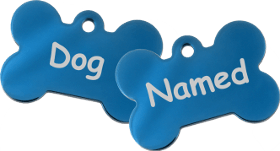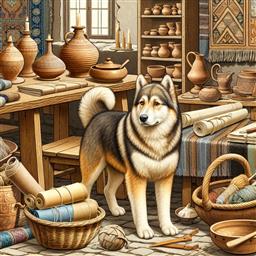6th Century Dog Names
Updated: June 12, 2024
Welcome to a fascinating journey through time, as we explore the world of canine appellations from a historical era over a millennium and a half ago. This page is dedicated to introducing you to the unique and rich tapestry of dog nomenclature from the 6th century, a time when names held deep significance and mirrored the cultural, social, and personal values of the age.
During this era, the bond between humans and dogs was already well-established, with dogs serving as hunters, protectors, and companions. This shared history is reflected in the variety and depth of the names bestowed upon these loyal creatures. These names often held particular meanings, drawn from the languages, myths, and folklore of various cultures around the world.
Whether you're a dog lover, a history enthusiast, or an eager reader, this collection of names provides a unique perspective on the past. It not only uncovers the bond between man and his best friend but also sheds light on the linguistic and cultural trends of an era long gone. So, get ready to delve into the interesting realm of historical dog nomenclature and who knows, you might just find some inspiration for naming your own four-legged companion.
| Name | Reason to Choose |
|---|---|
| Alaric | Named after Alaric I, a Visigothic King during the 6th century |
| Amalasuntha | Queen of the Ostrogoths in the 6th century |
| Anastasius | Byzantine Emperor of this era |
| Apollonius | Named after a renowned philosopher of the time period |
| Atticus | Atticus was a philosopher during this era |
| Augustus | Derived from the name of a prominent Roman Emperor, suggesting strength and dignity |
| Aurelius | Named after Marcus Aurelius, a notable figure during the 6th century |
| Basil | Basil of Caesarea was a notable figure during the 6th century |
| Basilica | Inspired by the architectural structures of the period |
| Belisarius | A general of the Byzantine Empire |
| Benedict | St. Benedict of Nursia, a significant religious figure, lived during this time |
| Boethius | An influential philosopher from this era |
| Brunhilda | For Brunhilda of Austrasia, a Visigothic queen |
| Bruno | A common name during the 6th century, meaning 'brown' in Old German |
| Cassian | Cassian of Imola was a saint in the 6th century |
| Cassiodorus | A statesman and scholar of the 6th century |
| Cato | Inspired by the Roman statesman and philosopher, known for his wisdom |
| Cerdic | A Saxon leader who established the Kingdom of Wessex |
| Chilperic | Named after a Frankish King |
| Chosroes | For Chosroes I, a Persian king |
| Cicero | Cicero was a philosopher during this era |
| Clovis | Derived from the name of a Frankish King |
| Columba | In honor of Saint Columba |
| Cyprian | A name of a prominent bishop in the 6th century |
| Dacian | Dacian was a bishop in the 6th century |
| Dacicus | A name synonymous with a warrior tribe during this time |
| Dagobert | Named after Dagobert I, a Frankish king |
| Darius | Originates from a Persian king's name, reflecting royal lineage |
| Dion | Dion of Prusa was a notable figure during the 6th century |
| Dionysius | In honor of Dionysius Exiguus, a 6th-century monk |
|
Suggest:
|
Submitted!
|
| 1 2 3 4 5 | |
6th Century Chinese Dog Names
| Name | Description |
|---|---|
| An | This translates to 'peace', suitable for a peaceful and calm dog |
| Bing | This is a name that means soldier, reflecting the military might of the era |
| Cai | It means 'wealth', indicating a valuable or treasured pet |
| Dai | This name means 'to shine', suitable for a dog with a shiny coat |
| Feng | It signifies 'wind', a natural element highly respected in Chinese culture |
| Hu | This name means 'tiger', suitable for a strong, powerful dog |
| Hui | This term means 'kind and gentle', qualities often admired in dogs |
| Jia | This name means 'good', indicating a good-natured dog |
| Jing | It translates to 'quiet and still', suitable for a calm and peaceful dog |
| Kai | This name means 'victory', suitable for a winning or successful dog |
| Lei | It means 'thunder', appropriate for a loud and boisterous dog |
| Lu | This name means 'deer', suitable for a swift and agile dog |
| Ming | It is derived from the Chinese dynasty, symbolizing brightness or enlightenment |
| Ning | This name means 'peaceful', often used to imply tranquility |
| Qi | This term refers to the life force or energy flow in traditional Chinese culture |
| Ru | This name means 'scholar', suitable for a smart or intelligent dog |
| Shan | This translates to 'mountain', symbolizing strength and stability |
| Tao | It represents 'the path' or 'the way', a fundamental concept in Taoism |
| Wei | This means 'powerful or mighty', suitable for a strong and courageous dog |
| Xin | This name means 'new' or 'fresh', denoting a new addition to the family |
| Yang | It represents the positive and bright aspect in Yin-Yang philosophy |
| Yuan | It translates to 'original or primary', denoting the beginning of something |
| Zhen | This name means 'precious', reflecting the value of dogs as companions |
| Zhi | This name means 'wisdom' or 'knowledge', appropriate for a smart dog |
|
Suggest:
|
Submitted!
|
6th Century Saxon Dog Names
| Name | Description |
|---|---|
| Æthelred | Derived from an ancient Saxon ruler's name |
| Alhfrith | Derived from an Anglo-Saxon prince's name |
| Beda | For the famous Saxon scholar, Bede |
| Berhtwald | Inspired by a Saxon Archbishop's name |
| Cutha | An ancient Saxon name for a dog |
| Cynewulf | Meaning 'Royal Wolf', a common dog name |
| Eadric | Reflects the name of a Saxon nobleman |
| Eadwulf | Named after a 6th century Saxon King |
| Ealhred | After a Saxon ruler from the era |
| Hengist | Pays homage to a Saxon military leader |
| Hereric | Inspired by a historical Saxon noble |
| Hildebert | In honor of a Saxon warrior |
| Horsa | Commemorating a Saxon warrior |
| Ingild | Recalls a historical Saxon figure |
| Leofric | Taken from a Saxon Earl's name |
| Mildred | To honor a Saxon saint |
| Osric | Named after a Saxon king |
| Oswiu | A Saxon king's name from the period |
| Penda | In tribute to a warrior king from the period |
| Rædwald | Comes from a Saxon King's name |
| Sigebert | In memory of a historic Saxon king |
| Theodoric | A Saxon name meaning 'People's Ruler' |
| Ulfilas | For a Saxon bishop from the 6th century |
| Wiglaf | A heroic Saxon warrior's name |
| Yffi | After a Saxon king's name |
|
Suggest:
|
Submitted!
|
6th Century Byzantine Dog Names
| Name | Description |
|---|---|
| Agathon | Originates from Byzantine Greek, meaning 'good' |
| Alexius | In tribute to Alexius I Comnenus, the Byzantine Emperor |
| Aurelius | Named after Marcus Aurelius, a significant figure during the Byzantine period |
| Basil | In honor of Basil I, the Byzantine Emperor |
| Chrysostom | Named after John Chrysostom, an important Early Church Father in Byzantium |
| Demetrius | A common Byzantine name, associated with Demetrius of Thessaloniki |
| Euphemia | Euphemia was a famous martyr in Chalcedon during the Byzantine era |
| Gregorius | Paying homage to Pope Gregory the Great, influential in the 6th century |
| Heraclius | Named after Heraclius, an important Byzantine Emperor |
| Isidore | In reference to Isidore of Miletus, a renowned Byzantine architect |
| Justinian | Commemorates Justinian I, a notable Byzantine Emperor |
| Kassiani | Kassiani was a celebrated Byzantine abbess and hymnographer |
| Leonidas | It's a popular name in the Byzantine era, echoing the famous Spartan king |
| Melania | In honor of Melania the Younger, a Christian saint in Byzantium |
| Nicephorus | Nicephorus was a common Byzantine name and means 'bringer of victory' |
| Olympius | A common name in Byzantine times, derived from Mount Olympus |
| Priscus | Priscus was a noted historian in the Byzantine Empire |
| Quintus | A prevalent Roman name, used in the Byzantine period |
| Severus | Named after Patriarch Severus, an influential figure in the Byzantine church |
| Theodora | In memory of Theodora, a revered Empress of the Byzantine Empire |
| Ulpianus | Ulpianus was a renowned Roman jurist, respected in the Byzantine era |
| Valens | Named after Emperor Valens, a significant figure in Byzantine history |
| Xenophon | In honor of Xenophon, a famous ancient Greek philosopher and historian |
| Ypatia | Ypatia was a famous female philosopher in Byzantium |
| Zosimus | Zosimus was a respected Byzantine historian |
|
Suggest:
|
Submitted!
|
6th Century Celtic Dog Names
| Name | Description |
|---|---|
| Bran | This name is derived from the Celtic god Bran, revered in the 6th Century |
| Cormac | Cormac was a common name among Celtic kings during this period |
| Eire | The Celtic word for Ireland, a significant location in 6th Century Celtic culture |
| Finn | Finn was a legendary Celtic hero in the 6th Century |
| Gwenn | Gwenn means 'white' in Celtic, a common color for dogs |
| Huon | Huon was a popular name among Celtic warriors in the 6th Century |
| Idris | Derived from a famous Celtic king of the 6th Century |
| Jory | Jory is a Celtic name meaning 'farmer', a common occupation in the 6th Century |
| Keir | Keir means 'dark' in Celtic, reflecting the dark fur of many dogs |
| Lugh | Lugh was a revered Celtic god in the 6th Century |
| Mael | Mael is a Celtic name meaning 'chief', reflecting the loyal nature of dogs |
| Niall | Niall was a common Celtic name during this period, meaning 'champion' |
| Oisin | Oisin was a legendary Celtic poet in the 6th Century |
| Pwyll | Pwyll was a Celtic hero in mythology from this era |
| Quinlan | Quinlan is a Celtic name meaning 'fit and strong', suitable for a dog |
| Ronan | Ronan was a popular name among Celtic men in the 6th Century |
| Sorcha | Sorcha means 'bright' in Celtic, a fitting description for a dog's personality |
| Taran | Taran was the Celtic god of thunder in the 6th Century |
| Urien | Urien was a famous Celtic king in the 6th Century |
| Vivian | Vivian is a Celtic name meaning 'alive', reflecting a dog's lively nature |
| Wynn | Wynn is a Celtic name meaning 'blessed', reflecting the joy dogs bring |
| Xander | A variant of Alexander, a name known among Celts due to cultural exchange |
| Yseult | Yseult was a legendary Celtic princess in the 6th Century |
| Zaira | Zaira means 'princess' in Celtic, a fitting name for a cherished pet |
|
Suggest:
|
Submitted!
|
6th Century Roman Dog Names
| Name | Description |
|---|---|
| Alexander | Named after the Roman Emperor Alexander Severus |
| Antoninus | An homage to the Roman Emperor Antoninus Pius |
| Augustus | Named after the famous Roman Emperor |
| Caracalla | After the Roman Emperor Caracalla |
| Claudius | In honour of the Roman Emperor Claudius |
| Commodus | Named after the Roman Emperor Commodus |
| Decius | Inspired by the Roman Emperor Decius |
| Domitian | Derived from the name of the Roman Emperor Domitian |
| Elagabalus | Inspired by the Roman Emperor Elagabalus |
| Geta | An homage to the Roman Emperor Geta |
| Gordian | After the Roman Emperors Gordian I, II, and III |
| Hadrian | After the Roman Emperor Hadrian |
| Lucius | After Lucius Verus, the co-emperor with Marcus Aurelius |
| Marcus | In honour of the Roman Emperor Marcus Aurelius |
| Maximinus | Derived from the name of the Roman Emperor Maximinus Thrax |
| Nero | After Nero, a famous Roman Emperor |
| Pertinax | Inspired by the Roman Emperor Pertinax |
| Philip | An homage to the Roman Emperor Philip the Arab |
| Septimius | In honour of the Roman Emperor Septimius Severus |
| Titus | Named after the Roman Emperor Titus |
| Trajan | Inspired by the Roman Emperor Trajan |
| Trebonianus | In honour of the Roman Emperor Trebonianus Gallus |
| Valerian | Named after the Roman Emperor Valerian |
| Vespasian | An homage to Roman Emperor Vespasian |
| Vitellius | Inspired by the Roman Emperor Vitellius |
|
Suggest:
|
Submitted!
|
User Submitted Images
There are currently no user submitted images for this page. This is your opportunity to be the first! Submit your photo below.
User Recommendations
There are currently no name recommendations for this page. This is your opportunity to be the first! Make your recommendation below.
Recently Updated
We would like to take this time to thank all of our visitors that make DogNamed.com the best dog naming resource on the web. Our site would not be where it is today without your suggestions, ratings, and photo submissions. So pat yourselves on the back for a job well done and keep up the good work! If you have any comments, suggestions, or ideas for the this page or any part of our site, don't hesitate to drop us a line on our Contact Page. Thank you! -The DogNamed Team




























